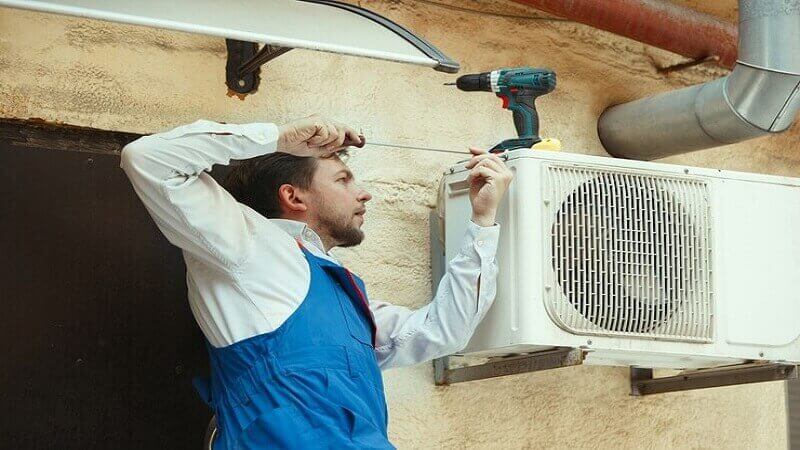Air conditioning (AC) systems are essential for maintaining comfort, especially during hot seasons. However, like all machines, they can develop issues over time. When your AC starts acting up, it may be giving you subtle or obvious signs that it needs immediate repair. Ignoring these signs can lead to more significant problems, costly repairs, or even the complete breakdown of your unit. This article will guide you through the key indicators that your AC is in distress and why you should address these issues without delay.
Weak Airflow: A Cry for Help
When you notice weak airflow from your AC vents, it’s a clear sign that something is amiss. Weak airflow can stem from several issues, including a clogged air filter, a malfunctioning blower fan, or even blocked ducts. When the airflow is reduced, your AC system must work harder to cool your space, leading to increased energy consumption and reduced comfort.
Explanation:
A clogged air filter is often the most straightforward issue to resolve. Over time, dust, pollen, and other debris can accumulate on the filter, restricting the airflow. This not only reduces the efficiency of your AC but can also cause the system to overheat. If the problem lies with the blower fan or ducts, the issue could be more severe, requiring professional inspection and repair. Ignoring weak airflow can lead to further strain on your AC system, potentially causing more extensive damage.
Warm Air Instead of Cool: A Red Flag
One of the most obvious signs that your AC needs immediate attention is when it blows warm air instead of cool. This issue could be due to a variety of factors, including low refrigerant levels, a malfunctioning compressor, or a broken thermostat. Each of these problems requires prompt diagnosis and repair to prevent further complications.
Explanation:
Low refrigerant levels are a common cause of warm air and indicate a leak in the system. Refrigerant is the substance that cools the air in your AC, and when it leaks, the cooling process is compromised. A malfunctioning compressor, the component responsible for circulating the refrigerant, can also result in warm air. If the thermostat is faulty, it may not be correctly signaling the AC to cool the air. Addressing warm air issues promptly can prevent the complete failure of your AC system.
Strange Noises: Your AC’s Way of Communicating
AC units are typically designed to operate quietly. If you start hearing unusual noises such as grinding, squealing, or banging, it’s a sign that something is wrong. These noises often indicate mechanical problems that need immediate attention to prevent further damage.
Explanation:
Grinding noises may signal issues with the motor bearings, while squealing could indicate a problem with the fan belt. Banging or clunking sounds might suggest a loose or broken component within the unit. These noises can escalate into more significant issues if left unchecked. For instance, a failing motor could lead to a complete breakdown of your AC, requiring a costly replacement. Therefore, addressing strange noises early on can save you from expensive repairs and extend the lifespan of your AC unit.
Foul Odors: A Sign of Underlying Problems
An AC system that emits foul odors is not only unpleasant but also a sign of potential health hazards. Unusual smells coming from your AC can be due to various issues, such as mold growth, burnt-out wire insulation, or accumulated debris in the ducts.
Explanation:
Mold growth inside your AC is a serious concern, as it can spread throughout your home, leading to respiratory issues and other health problems. This typically occurs when moisture accumulates in the system, providing a breeding ground for mold and mildew. A burnt smell could indicate that the electrical components inside the unit are overheating, which is a fire hazard. Additionally, musty odors might suggest that debris has built up in the ducts, reducing airflow and affecting the overall efficiency of your system. Addressing these odors promptly can prevent health risks and further damage to your AC.
Frequent Cycling: A Sign of Inefficiency
If your AC is frequently turning on and off, a process known as short cycling, it’s a sign that something is wrong. Frequent cycling can be caused by issues such as an oversized AC unit, low refrigerant levels, or a malfunctioning thermostat.
Explanation:
Short cycling not only reduces the efficiency of your AC but also increases wear and tear on the system, leading to a shorter lifespan. An oversized AC unit may cool the space too quickly, causing it to shut off before completing a full cycle, which can lead to uneven cooling and increased humidity. Low refrigerant levels can also cause the system to short cycle, as it struggles to maintain the desired temperature. A faulty thermostat may incorrectly signal the AC to turn on and off at inappropriate times. Resolving the root cause of frequent cycling is essential to ensure your AC operates efficiently and lasts longer.
High Humidity Levels: A Symptom of AC Failure
One of the primary functions of an AC system is to remove excess humidity from the air. If you notice that your home feels more humid than usual, even when the AC is running, it’s a sign that your system is not working correctly.
Explanation:
High humidity levels can make your home feel uncomfortable and exacerbate issues such as mold growth and wood damage. Your AC may fail to dehumidify the air properly due to problems like a malfunctioning evaporator coil or an incorrect system size. The evaporator coil is responsible for removing moisture from the air, and when it fails, the humidity levels can rise. An AC system that is too large or too small for your space may also struggle to regulate humidity effectively. Addressing humidity issues promptly can improve comfort and prevent damage to your home and belongings.
Leaking Water or Refrigerant: A Warning Sign
Water or refrigerant leaks around your AC unit are a clear sign that something is wrong and needs immediate attention. These leaks can indicate a variety of issues, from a clogged drain line to a refrigerant leak, both of which can lead to serious problems if left unaddressed.
Explanation:
A clogged drain line can cause water to back up and leak around the unit, potentially damaging your home and leading to mold growth. Refrigerant leaks are more serious, as they not only reduce the efficiency of your AC but can also pose environmental and health risks. Refrigerant is a toxic substance, and its leakage requires immediate professional repair to prevent harm to you and the environment. Additionally, a refrigerant leak will cause your AC to lose its cooling ability, leading to increased energy bills and discomfort. Addressing leaks promptly is essential to prevent further damage and ensure the safety and efficiency of your AC system.
High Energy Bills: A Silent Alarm
If you notice a sudden spike in your energy bills without any significant change in your usage, your AC might be the culprit. High energy bills can be a sign that your AC is struggling to operate efficiently due to underlying issues.
Explanation:
Several factors can contribute to increased energy consumption by your AC, including dirty filters, low refrigerant levels, or an aging system. A dirty air filter can restrict airflow, causing the system to work harder and consume more energy. Low refrigerant levels force the AC to run longer to achieve the desired temperature, increasing energy usage. An aging AC unit may simply be less efficient than it once was, leading to higher operating costs. By addressing these issues promptly, you can reduce your energy bills and extend the life of your AC system.
Inconsistent Temperatures: A Sign of Imbalance
If you find that some rooms in your home are cooler than others, or if the temperature fluctuates throughout the day, your AC may be experiencing issues. Inconsistent temperatures can be caused by a variety of factors, including blocked vents, a malfunctioning thermostat, or an improperly sized AC unit.
Explanation:
Blocked vents or ducts can prevent cool air from reaching certain areas of your home, leading to uneven temperatures. A malfunctioning thermostat may not accurately detect the temperature, causing the AC to overcool or undercool certain areas. An AC unit that is too large or too small for your space may also struggle to maintain a consistent temperature throughout your home. Addressing these issues is crucial for ensuring balanced cooling and maintaining comfort in every room.
Old Age: The Ultimate Indicator
Finally, the age of your AC system is a significant factor in determining whether it needs repair or replacement. Most AC units have a lifespan of 10 to 15 years. If your system is approaching or has surpassed this age, it’s more likely to experience frequent breakdowns and reduced efficiency.
Explanation:
As your AC system ages, its components wear out, making it more prone to malfunctions and less efficient at cooling your home. While regular maintenance can extend the life of your system, there comes a point where repairs are no longer cost-effective. An aging AC unit may require frequent repairs, leading to higher costs and less reliability. In some cases, it may be more economical to replace the system with a newer, more efficient model. Upgrading to a modern AC unit can provide better cooling, lower energy bills, and improved comfort.
Conclusion:
Your AC system is vital for maintaining comfort in your home, especially during hot weather. Ignoring the signs that your AC needs immediate repair can lead to more significant problems, higher costs, and even the complete failure of your system. By paying attention to weak airflow, warm air, strange noises, foul odors, frequent cycling, high humidity levels, leaks, high energy bills, inconsistent temperatures, and the age of your system, you can address issues early and keep your AC running smoothly.

